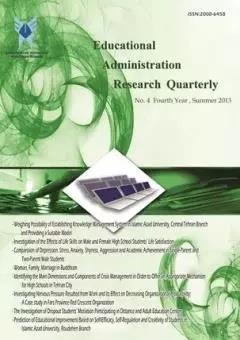Investigating students' willingness to consume green products with an approach on environmental education
Subject Areas : Educational managementAhmad Ali Oumouei Milan 1 , Raoof Emami Razliqi 2 , Parisa Oumouei Milan 3 , Masumeh Danesh Shakib 4
1 - Department of Industrial Management, Qazvin Islamic Azad University, Iran
2 - Department of Industrial Management, Qazvin Islamic Azad University, Qazvin, Iran
3 - Department of Information Technology Management, Raja University, Qazvin, Iran
4 - Assistant Professor, Department of Industrial Management, Qazvin Islamic Azad University, Iran
Keywords: green marketing, environmental education, sustainable consumption, consumers' attitude and behavior,
Abstract :
Abstract: In the face of contemporary environmental challenges, including climate change, pollution and destruction of natural resources, the need for sustainable solutions and promoting environmentally friendly behaviors is increasingly felt. Environmental trainings and green marketing as two basic tools can play an important role in improving the awareness, knowledge and attitude of people towards the environment and encouraging them to consume green products. The aim of this study is to investigate the effect of environmental education on the attitude and behavior of student consumers in buying green products.
The research method used in this research is descriptive and has been done by reviewing the literature and analyzing the collected data using SPSS software. The innovation of this research is the simultaneous examination of the effects of environmental education and green marketing on students' consumption behavior and attitude towards products. Green is hidden. This review can provide new solutions to promote sustainable consumption and thus play a key role in improving consumption behaviors and protecting the environment. The findings of this research indicate that environmental education can have a positive effect on students' awareness, knowledge, attitude and consumer behavior towards green products.
Also, green marketing can be used as an effective tool in promoting the consumption of green products among students. The results of this research can be useful for educational planners and marketers to design effective programs to promote the consumption of green products among students.
مراجع [1] بررسی نقش آموزش های زیست محیطی در کاهش مخاطرات سلامت، نویسندگان: اعظم لطیف پور گل اندام [2022]
[2] فراتحلیل اثربخشی برنامه های آموزش محیط زیست بر سواد زیست محیطی در ایران، نویسندگان: سیروس محمودی [2021]
[3] جایگاه رسانه های ارتباط جمعی در آموزش، نگرش و اخلاق زیست محیطی، نویسندگان: سیدجواد هاشمی، الهه خلیلی [2022]
[4] Abdulrazak, S., Quoquab, F., 2018. Exploring consumers’ motivations for sustainable consumption: a self-Deterministic approach. J. Int. Consum. Market. 30, 14–28. https://doi.org/10.1080/08961530.2017.1350.
[5] Aguilar, F.X., Cai, Z., 2010. Conjoint effect of environmental labeling, disclosure of forest of origin and price on consumer preferences for wood products in the US and UK. Ecol. Econ. 70, 308–316. https://doi.org/10.1016/j.ecolecon.2010.09.002.
[6] Alfiero, S., Christofi, M., Bonadonna, A., 2019. Street food traders, farmers and sustainable practice to reduce food waste in the Italian context. Br. Food J. 122, 1361–1380. https://doi.org/10.1108/BFJ-04- 2019-0265.
[7] Blanco-Portela, N., R-Pertierra, L., Benayas, J., Lozano, R., 2018. Sustainability leaders’ perceptions on the drivers for and the barriers to the integration of sustainability in Latin American Higher Education Institutions. Sustainability 10, 8. https://doi.org/ 10.3390/su10082954.
[8] Booi-Chen, T., Teck-Chai, L., 2009. Examining sustainable consumption patterns of young consumers: is there a cause for concern? J. Int. Soc. Res. 2, 465–472.
[9] Brecard,´ D., 2014. Consumer confusion over the profusion of eco-labels: lessons from a double differentiation model. Resour. Energy Econ. 37, 64–84. https://doi.org/ 10.1016/j.reseneeco.2013.10.002
. [10] Brecard,´ D., Hlaimi, B., Lucas, S., Perraudeau, Y., Salladarr´e, F., 2009. Determinants of demand for green products: an application to eco-label demand for fish inEurope. Ecol. Econ. 69, 115–125. https://doi.org/10.1016/j.ecolecon.2009.07.017.
[11] Brough, A., Wilkie, J., Jingjing, M.A., Isaac, M., Gal, D., 2016. Is eco-friendly unmanly? The green-feminine stereotype and its effect on sustainable consumption. J. Consum. Res. 43, 567–582. https://doi.org/10.1093/jcr/ucw044.
[12] Carmi, N., Arnon, S., Orion, N., 2015. Transforming environmental knowledge into behavior: the mediating role of environmental emotions. J. Environ. Educ. 46, 183–201. https://doi.org/10.1080/00958964.2015.1028517.
[13] Carson, R., 1965. The Sense of Wonder, first ed. ed. Harper And Row Publishers, New York.
[14] Carson, R., 1962. Silent Spring. Houghton Mifflin, Boston, 1962.
[15] Cespedes-Dominguez, C., Fernandez-Robin, C., McCoy, S., 2021. The effects of celebrity characteristics on purchase intentions: a focus on consumer concern of environmental issues. Sustainability 13, 40–83. https://doi.org/10.3390/ su13084083.
[16] Dangelico, R.M., Vocalelli, D., 2017. Green Marketing”: an analysis of definitions, strategy steps, and tools through a systematic review of the literature. J. Clean. Prod. 165,1263–1279. https://doi.org/10.1016/j.jclepro.2017.07.184.
[17] de Carvalho, B.L., Salgueiro, M. de F., Rita, P., 2015. Consumer Sustainability Consciousness: a five dimensional construct. Ecol. Indicat. 58, 402–410. https://doi. org/10.1016/j.ecolind.2015.05.053.
[18] de Winter, J.C.F., Dodou, D., 2010. Five-point likert items: T test versus Mann-Whitney-Wilcoxon. Practical Assess. Res. Eval. 15, 11. https://doi.org/10.7275/bj1p-ts64.
[19] Devinney, T., Auger, P., Eckhardt, G., 2010. The Myth of the Ethical Consumer Hardback with DVD. Cambridge University Press.
[20] Ferdousi, F., Qiang, D., 2016. Implementing circular economy and its impact on consumer ecological behavior. J. Innovat. Sustain. 7 (1), 3–10.
[21] Fraj, E., Martinez, E., 2007. Ecological consumer behaviour: an empirical analysis. Int. J. Consum. Stud.


